- Home
- Janice Kay Johnson
The Closer He Gets Page 2
The Closer He Gets Read online
Page 2
Time seemed to have slowed. Zach saw what was coming and knew he was too late to stop it. The Hispanic guy toppled back. His head struck the edge of the concrete step. The sound was terrible. A pumpkin being smashed.
One step too late, Zach grabbed the deputy’s shoulder and yanked him back. “What the hell are you doing?” he yelled.
The guy staggered, righted himself and lurched around in a fighter’s stance. Face crimson with rage, he started to swing at Zach before recognition dawned in his eyes and he stopped himself.
“He went for my gun.” He gasped for air. “He went for my gun, goddamn it! I had to defend myself.”
Hayes, that was his name. Andrew Hayes. Big, beefy guy starting to go soft. Ugly sense of humor. Zach knew him only from the locker room.
“Oh, my God. Oh, my God.” Keening, the woman had dropped to her knees beside the victim, who wasn’t moving. “Is he dead? I think he might be dead.”
Hayes looked past Zach and said sharply, “Ma’am, you need to back away. This is police business. Return to your house.”
She lifted her head to sizzle him with green-gold eyes. “Antonio is harmless. You killed him.”
“Ma’am, you need to listen—”
Zach gave him a hard push. “Back off and shut up. Do you hear me?”
That earned him some invectives.
Ignoring him, Zach turned his attention to the victim when, out of the corner of his eye, he saw Hayes lean over to pick up his baton. Swearing, Zach slapped a hand onto the deputy’s chest. “Do I have to cuff you?” he asked, voice hard. “You will keep back. Don’t move. Don’t touch. Do you hear me?”
“What the hell? We’re on the same side. The asshole grabbed for my weapon! I did what I had to.”
“This is now a crime scene. Don’t touch anything. Wait.”
Zach called for backup and an ambulance. When he saw Hayes take a step toward his vehicle anyway, he snapped, “Do not move!”
Then, finally, he crouched beside the fallen man and gently touched his throat.
Oh, damn. The lady with the green-gold eyes was right. Antonio was dead. Zach couldn’t even figure out how to administer first aid, the guy’s head was such a sickening sight.
The woman and he looked at each other across the body. Momentarily stunned, Zach stared for a few beats too long. Her right hand was bloody, he saw when he could finally wrench his gaze from her face. She’d touched the victim when she’d first fallen to her knees beside him.
Zach lifted his own hand to see that, yeah, his own fingertips were bloody, too.
At the sound of an approaching siren, he said gently, “There’s nothing you can do. The medics will be here any minute.”
She looked down then back up. “He’s dead, isn’t he?”
“I’m afraid so.”
“Why?” she whispered.
“I have no idea.” An ambulance rocketed to a stop in the driveway only a few feet away. Zach stood, circled to her side of the body and held out his hand. “Let’s back off and let them do their job.”
An unmarked police SUV blocked Zach’s car in. Having cut off the siren, the undersheriff himself, a whipcord-thin guy with buzz-cut gray hair, stepped out and started across the lawn. Paul Stokes. He’d been in on the interview when Zach was hired.
“Hayes? What the hell is this?”
The woman still hadn’t moved.
“Please,” Zach said quietly. “I need to talk to people. They’ll want to hear what you saw, too.”
After a moment her head bobbed. She let him pull her to her feet and backed away as medics crouched to conduct an assessment. It wasn’t long before one glanced up and gave his head the faintest of shakes. Zach nodded and walked toward the undersheriff and Andrew Hayes.
Seemingly unaware that his hands were battered and bloody, Hayes was doing all the talking. Zach, eyes narrowed, listened but kept his mouth shut. He’d have his turn. And unless the woman wimped out, there was a second witness.
Unable to help himself, he turned his head. She stood right where he’d left her, shoulders hunched, hugging herself, her stricken gaze fixed on the dead man.
But suddenly, as if she felt a pull, her head turned, too, and her eyes met Zach’s. Once again they stared, neither blinking, nothing hidden.
“Deputy Carter,” Stokes said sharply.
Zach shook himself, bent his head in acknowledgment to the woman—of what?—and faced his commanding officer.
* * *
TESS GRANATH LEANED against the fender of one of the police cars. She had declined the offer to sit in the backseat—behind the wire grille.
“Ms. Granath...or is it ‘missus’?” the officer asked.
Not officer, she reminded herself, or even deputy. He had identified himself as a detective. She groped to remember his name. Delancy or Delaney or something like that. He was in his forties, at a guess, and had too many muscles, which meant off the job he lived at the gym.
“Ms. is fine.”
“Are you married?”
Tess raised her eyebrows. “How is this relevant to what I saw?”
“Just trying to get some background, ma’am.” He paused. “Spouses, what we do for a living, influences our perceptions.”
The “ma’am” irritated her, after all that crap about whether she was a Ms. or a Mrs. The use of the word “perceptions” irritated her even more. The event she’d witnessed was straightforward. It had happened too fast for any filters to kick in.
“I’m not married.”
“All right then, Mi-izz Granath.” He dragged it out, his tone laden with condescension. “You live here close by?”
Since he held her driver’s license in his hand, he knew exactly where she lived. She said, “No.”
“May I ask your purpose for being here?”
“I was checking on a friend next door who recently had surgery.”
“And this friend’s name?”
“Lupe Estrada.”
“I’m surprised this friend hasn’t come out. Given all the commotion and all.”
“As I said, she had surgery. Abdominal. She is barely able to get up long enough to go to the bathroom. I stopped by to see if she needed anything because her husband had to work today.”
The detective wanted to know if she and Lupe had been friends for long. Since high school. So that meant Tess might have met some of the neighbors, too. Yes, she had.
“What about the fellow who was involved in this fracas?”
“If by that you mean the man who was just beaten to death? Yes. I knew him to nod at. I wouldn’t call him a friend.”
“But you know his name.”
“Yes. Antonio. Antonio Alvarez, I think.”
“So you saw him as a nice guy.”
“He seemed pleasant. I understand he lived here with his uncle and a couple of cousins. Antonio is a friend of Lupe’s husband, Rey. As I said, I don’t—” the word caught in her throat “—didn’t know him well.”
“All right,” he said. “When did you first see him today?”
“I’d left my sweater and handbag in the living room. On my way out, I was reaching for them when I glanced out the window and was surprised to see a police car parked in front of Antonio’s house. I could just see him and the deputy, speaking.”
“And where were they standing?”
“Antonio had stepped down from the porch. I could see that the conversation was...heated.”
“Could you hear what was being said?”
“Not at that point. Only enough to know they were yelling. The deputy’s face was flushed, as if he was angry.”
“Now that’s quite an assumption, given you don’t know him.” The detective affected a look of surprise. “Or do you?”
“I do not.” And wouldn’t want to, she thought grimly.
“Then you have no basis for comparison.”
“No, I don’t. However—” She lifted her hand when he started to interrupt. “In my experience, a combination of a raised voice and flushed cheeks generally suggests anger in any individual.”
It went on that way. He tried hard to persuade her to admit she hadn’t seen what had preceded the first blow. But she had. By that time she’d been on the Estradas’ front porch with a clear sight line to the two men arguing.
“I was concerned because the police officer was considerably larger than Antonio. His voice and body language were belligerent.”
“But your friend Antonio was angry, too.”
“As I’ve said repeatedly, I wouldn’t describe him as a friend. It was clear they were arguing about a woman. Just before the first blow was struck, Antonio accused the police officer of hurting her. The deputy told him to stay away from her, pulled his nightstick from his belt, lifted it and swung. That first blow knocked Antonio back a step. The deputy pursued.”
Delancy kept circling back to what she’d seen when. “Now, you must have looked away at some point.”
She shook her head. “I don’t think I so much as blinked. I may have missed something as I bounded down the porch steps, but your deputy was well into the beating by then. The second police car had pulled up and I saw that officer racing toward them even as I ran across the yard.” She swallowed. “We were both too late.”
“You approached from the left of the two men engaged in the argument.”
Since she’d described, ad infinitum, exactly where she was at all times, she said nothing.
“Deputy Hayes wears his service weapon on his right hip. Chances are good you couldn’t see it.”
She considered and finally agreed that, no, she probably hadn’t been able to.
He looked satisfied, thinking he’d made an important point. It wasn’t hard to figure out what that was.
Tess continued. “However, if you’re suggesting Antonio reached for the weapon, I can tell you that he did not. From where I stood, I was able to see his hands. He did not raise them or reach toward the deputy until he tried to cover his face after the beating commenced.”
God. She sounded like an attorney in court. Had she ever used the word “commenced” before? She kind of doubted it. But she’d never been interviewed by a police detective before, either. Or, in fact, anybody at all who so blatantly disbelieved every word out of her mouth. She’d had angry customers before, but none of them had tried so hard to twist what she said.
He asked more questions that were re-phrasings of ones he’d already asked.
Finally, Tess said, “Detective, I really need to get back to work. You’re welcome to contact me later if you need any more information.”
She had to ask for her driver’s license before he handed it over. The last thing he said was, “You’ve made one hell of an accusation here, Ms. Granath. I hope you know what you’re getting into.”
She had started toward her car but a sudden chill raised goose bumps on her arms. She turned around. “Just what is that supposed to mean, Detective Delaney?”
“Delancy. And I think you have a good idea. Deputy Hayes is a sixteen-year veteran of this department. He’s well liked and respected. And now here you are, suggesting he killed a man because he was a little annoyed.”
“Try furious,” she said bitingly. “If you didn’t know your Deputy Hayes has an anger-management problem, you should have.”
He said something else to her back but she didn’t listen and she didn’t look at him again.
Tess drove several blocks before she let herself pull over, put the gearshift in Park and rest her forehead against the steering wheel. Her heart raced, her hands shook and she was gasping for breath.
Oh, great. Now I’m falling apart.
Because she’d just seen a man killed? Or because she’d just been threatened by a police officer?
A broken laugh escaped her.
Eenie, meenie, miney, moe. God help her, she’d definitely caught a tiger by the toe.
She wanted rather desperately to believe she was overreacting. The detective might have been testing her to find out how strong a witness she’d be. It wasn’t as if shutting her up would do any good, considering that other sheriff’s deputy had been there, too. She would swear he’d been as appalled as she was. Angry, too.
Tess closed her eyes so she could picture him. Tall, lean, with unruly dark hair, shoving Deputy Hayes and snarling, “Back off and shut up.” And he’d said it was now a crime scene.
Her heartbeat picked up again as it occurred to her that he might have been warning the deputy to shut up before he said something they wouldn’t want her to hear.
But she remembered the way he’d touched Antonio’s neck in search of a pulse and then held out a hand to help her to her feet. When she asked why Antonio had had to die, the deputy had said, “I have no idea.”
And then there was the way he had looked at her. The way they had looked at each other. He’d been completely in command, except when his very blue eyes had met hers. Then he had let her see that he, too, had been shaken.
Or—God—she was imagining some kind of intense connection and his face hadn’t given away anything at all. He hadn’t shared the same stunned bewilderment, the same horror and grief she’d felt. She’d seen him talk quietly with whatever superior officer had arrived after the fact, and then he’d driven away in his patrol car. She wasn’t sure he’d so much as glanced at her again. He sure hadn’t attempted to speak to her before leaving.
It didn’t matter. She’d told the truth and she would keep telling it. And even if the sheriff’s department didn’t want to admit they had a bad apple, they were on the side of law, order and justice, right? That meant the investigator might pressure her, try to sway her testimony, but certainly wouldn’t threaten her.
Tess lifted her head from the steering wheel and made a face. No, she wasn’t that naïve, but she’d try to have some faith in local law enforcement.
Starting with the sheriff’s deputy who had run faster than she’d believed possible in his futile effort to save Antonio Alvarez.
CHAPTER TWO
“YOU HAVEN’T BEEN with us very long,” Sheriff Brown said kindly, although his eyes were a lot less friendly. “I know you come from a large city police department. Different atmosphere. We don’t get much turnover here, and there’s a reason. We think of ourselves as one big family. Times of trouble, we stand behind one another.”
Zach’s primary emotion was disbelief.
His initial, brief interview yesterday with Paul Stokes had been direct, an appropriate opening to a serious investigation. His impression was that the undersheriff had been as disturbed as Zach had been by the situation.
The talk he’d had earlier today with Stokes had been different. The undersheriff had been a little more closed off, his questions sharper, as if he was trying to shake Zach. He had suggested they handle this “incident” internally.
Zach now had a pretty good idea who had been leaning on him.
Sheriff Brown had used the word “incident,” too, when he’d made it clear that he wanted it swept under the carpet. Zach was supposed to be the broom.
His disbelief progressed through pissed to full-on fury.
A few minutes ago, as Zach had arrived in answer to the sheriff’s summons, Hayes had swaggered out of the office. As they’d passed within a foot of each other, he’d given Zach a look dark enough to lift the hairs on the back of his neck.
“You’re right,” Zach said calmly now to the sheriff. “My experience is with a considerably larger police force. Professionalism was emphasized.” He paused, watching Sheriff Brown’s eyes narrow. “What I saw yesterday was a deliberate
, brutal beating that led to a death. Maybe Deputy Hayes didn’t intend it to go that far. I can’t say. But the fact is, it did. What I heard gives me reason to believe the confrontation was over a personal issue, but Hayes was wearing the uniform when he instigated it, and he used his police baton as part of the beating. As far as I’m concerned, that takes him a step over the line from second-degree murder. He shamed law-enforcement officers everywhere.”
That hard stare never wavered from Zach’s face. Until now, he hadn’t made up his mind about the longtime sheriff. In his sixties, George T. Brown was mostly bald and carried forty or fifty pounds too much. His strength was a folksy, reassuring charm that appealed to voters.
Call him a cynic, but from his initial job interviews, Zach had suspected Brown was a figurehead, with the real decisions being made by Stokes, the undersheriff.
Looking into these shrewd, angry eyes now, Zach changed his mind. Brown was no figurehead. And he had to have been leaning heavily on Paul Stokes.
In his short time with the department, Zach had heard some sexist and racist jokes he didn’t like. There were only a couple of female deputies on this force. He couldn’t help noticing how few Hispanic deputies had been hired, too, considering the county population had to be a third Hispanic. One had risen to sergeant. Otherwise the command structure was Caucasian and male. Ditto for the detectives.
He’d heard the same kind of jokes on his last job, and the hiring of female and ethnic officers had lagged in most police departments. Here in Harris County, part of the problem lay in the fact that so many deputies were long-timers. Change would come, but only as those long-timers retired.
He wondered whether the prevailing attitude might have been a little different if the dead guy had been Caucasian. Say, the son of a local businessman instead of an uneducated farmworker who had turned out to be in this country illegally.
That meant the uncle and brother, presumably also illegals, had disappeared, unable to demand justice for Antonio.
The sheriff’s chair creaked as he leaned back. “Son, I’m going to give you a few days to think about this before you damage the reputation and career of a fellow officer. You go that route, I can’t swear anyone will buy in to what you have to say, anyway. Judges, prosecutors, defense attorneys...they all know and respect Andy Hayes. The man is a sixteen-year veteran of this department. You have any idea how many times he’s testified in court in those years?”

 Home Deadly Home
Home Deadly Home From Father to Son
From Father to Son All the Lost Little Horses (A Desperation Creek Novel Book 2)
All the Lost Little Horses (A Desperation Creek Novel Book 2) Hide the Child
Hide the Child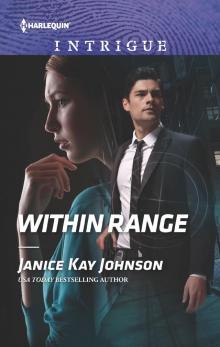 Within Range
Within Range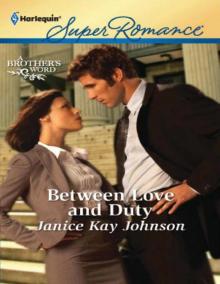 Between Love and Duty
Between Love and Duty First Comes Baby
First Comes Baby Charlotte's Homecoming
Charlotte's Homecoming In A Heartbeat (HQR Superromance)
In A Heartbeat (HQR Superromance) The Call of Bravery
The Call of Bravery In Hope's Shadow
In Hope's Shadow Anything for Her
Anything for Her Harlequin Superromance September 2014 - Bundle 1 of 2: This Good ManPromises Under the Peach TreeHusband by Choice
Harlequin Superromance September 2014 - Bundle 1 of 2: This Good ManPromises Under the Peach TreeHusband by Choice The Baby Agenda
The Baby Agenda More Than Neighbors
More Than Neighbors Her Amish Protectors
Her Amish Protectors All That Remains
All That Remains Whisper of Revenge (A Cape Trouble Novel Book 4)
Whisper of Revenge (A Cape Trouble Novel Book 4) In a Heartbeat
In a Heartbeat A Mother's Claim
A Mother's Claim Because of a Girl
Because of a Girl Back Against the Wall
Back Against the Wall Dangerous Waters
Dangerous Waters Mommy Said Goodbye
Mommy Said Goodbye A Mother's Secret
A Mother's Secret See How She Runs (A Cape Trouble Novel Book 2)
See How She Runs (A Cape Trouble Novel Book 2) Plain Refuge
Plain Refuge Bringing Maddie Home
Bringing Maddie Home For the Girls' Sake
For the Girls' Sake Through the Sheriff's Eyes
Through the Sheriff's Eyes Yesterday's Gone (Two Daughters Book 1)
Yesterday's Gone (Two Daughters Book 1) All a Man Is
All a Man Is Harlequin Superromance January 2014 - Bundle 1 of 2: Everywhere She GoesA Promise for the BabyThat Summer at the Shore
Harlequin Superromance January 2014 - Bundle 1 of 2: Everywhere She GoesA Promise for the BabyThat Summer at the Shore No Matter What
No Matter What Wakefield College 01 - Where It May Lead
Wakefield College 01 - Where It May Lead Someone Like Her
Someone Like Her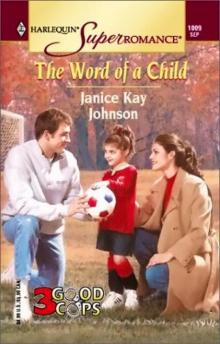 THE WORD OF A CHILD
THE WORD OF A CHILD Harlequin Superromance May 2016 Box Set
Harlequin Superromance May 2016 Box Set Open Secret
Open Secret The New Man
The New Man Finding Her Dad
Finding Her Dad The Perfect Mom
The Perfect Mom All Through The House
All Through The House Match Made in Court
Match Made in Court Making Her Way Home
Making Her Way Home From This Day On
From This Day On To Love a Cop
To Love a Cop The Hero's Redemption
The Hero's Redemption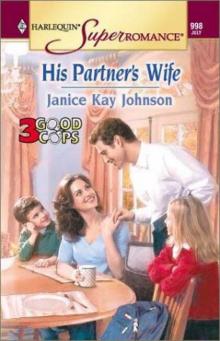 HIS PARTNER'S WIFE
HIS PARTNER'S WIFE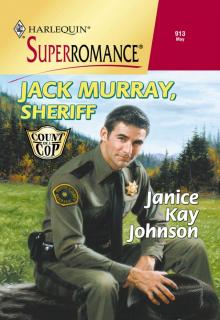 Jack Murray, Sheriff
Jack Murray, Sheriff Dead Wrong
Dead Wrong Twisted Threads (A Cape Trouble Novel Book 3)
Twisted Threads (A Cape Trouble Novel Book 3)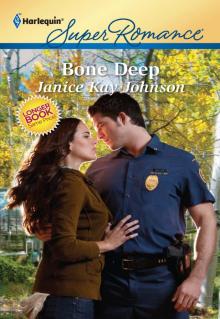 Bone Deep
Bone Deep The Closer He Gets
The Closer He Gets With Child
With Child Whose Baby?
Whose Baby? Kids by Christmas
Kids by Christmas